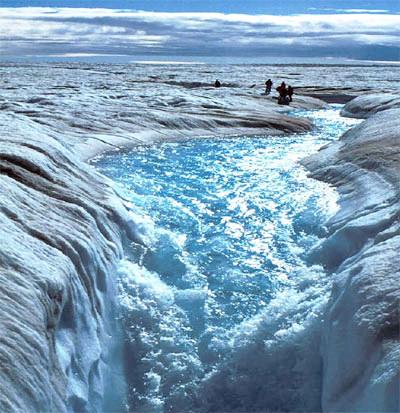
GREENLAND ISN’T FOR THE FANT-HEARTED

Greenland is moving deliberately, but resolutely, in preparing to develop its oil and gas and other mineral resources, its premier said at the Brookings Institution. Realizing that potential could take at least 20 years, other speakers indicated at the Sept. 24 event where a new report on the subject was released.
Harsh conditions off Greenland's coast pose a challenge with currently available oil and gas technology, according to the report, "The Greenland Gold Rush: Promise and Pitfalls of Greenland's Energy and Mineral Resources."
The report's executive summary said, "Although global warming is marking Arctic waters more accessible, icebergs remain a potential hazard, and exploration is still limited to a few months in the summer when daylight hours are suitable."
It said, "Based on our analysis and our conversations within the industry, we find that it could be decades before commercial oil production in Greenland takes place."
Greenland adopted self-rule, which includes control of its natural resources, in 2009 but remains part of Denmark, Premier Aleqa Hammond noted. "We actually have been promoting our oil and gas interests in Canada and the US for years," she said.
Three consortiums received licenses in the autonomous country's eastern offshore area last year, Hammond said. Operators will be required to apply the best environmental control technologies that are available, she said. "There continues to be seismic activity in all the prospects. We realize these things take time," she said.
Norway's example
Hammond said Greenland continues to take inspiration from Norway and other countries' resources development approaches, and makes sure all applicants are qualified to operate in Arctic environments. "The [International Maritime Organization] and other international actors also take this issue seriously," she said.
The government also realizes there are significant challenges, Hammond continued. "We are a small population on a big land mass. Infrastructure is very limited. There are no multilane, divided highways along our coasts," she said. "But we also have centuries of experience operating under consistent rules of law."
Hammond said, "We have potential, but Greenland is not for the faint-hearted. It will take time. We do not have the workforce—only 56,000 people, including those not born in Greenland. So many more people would come, and it will have an import on our lives, economy, and culture." But it's necessary for the country's economy to grow beyond fishing and for living conditions to improve, she said.
Its development aspirations may be overly ambitious, suggested Charles K. Ebinger, who directs the Energy Security Initiative within the Brookings Foreign Policy Program. "With global commodity prices falling and the recession lingering in Europe, we believe investors will hesitate committing to new projects there," he said during a discussion following Hammond's remarks.
Ebinger said Greenland is part of a trend in which Arctic offshore oil and gas resources have become less economically attractive relatively to unconventional resources farther south. "Speaking with multinational oil companies, we have found most believe Greenland's offshore oil and gas won't be developed within the next decade, but looks more promising in the 10-20 year timeframe," he said.
"Large-scale resource extraction will take place in Greenland, but the government would be well advised to manage expectations," Ebinger said.
Not yet explored
Minik T. Rosing, a University of Copenhagen geology professor who has led more than 30 field projects in Greenland, agreed. "For petroleum, most people believe development will take place not in 10, but 20-50 years," he said. "Greenland's geology has been studied extensively for 100 years, but there's been little exploration. That's an important distinction."
Rosing sees a misunderstanding in Greenland that the resources themselves are valuable. "It's their extraction that generates income," he pointed out. "But Greenland is the most developed part of the Arctic with a functioning government. Nobody would be better qualified to move ahead."
Hammond reiterated that Greenland has the potential to develop its resources but faces big economic challenges. "Mineral and oil and gas prices fluctuate, but Greenland's resources are still significant," she said.
"Companies which would like to be partners would be welcome," she said. "We will do business with them on international terms, but we won't compromise with any of them simply to get money."
Hammond said that when she was in school, "I never saw a Greenland doctor or geologist. Now, I take them for granted. Greenland has been preparing for its future for some time. It intends to be ready."
ogj.com





